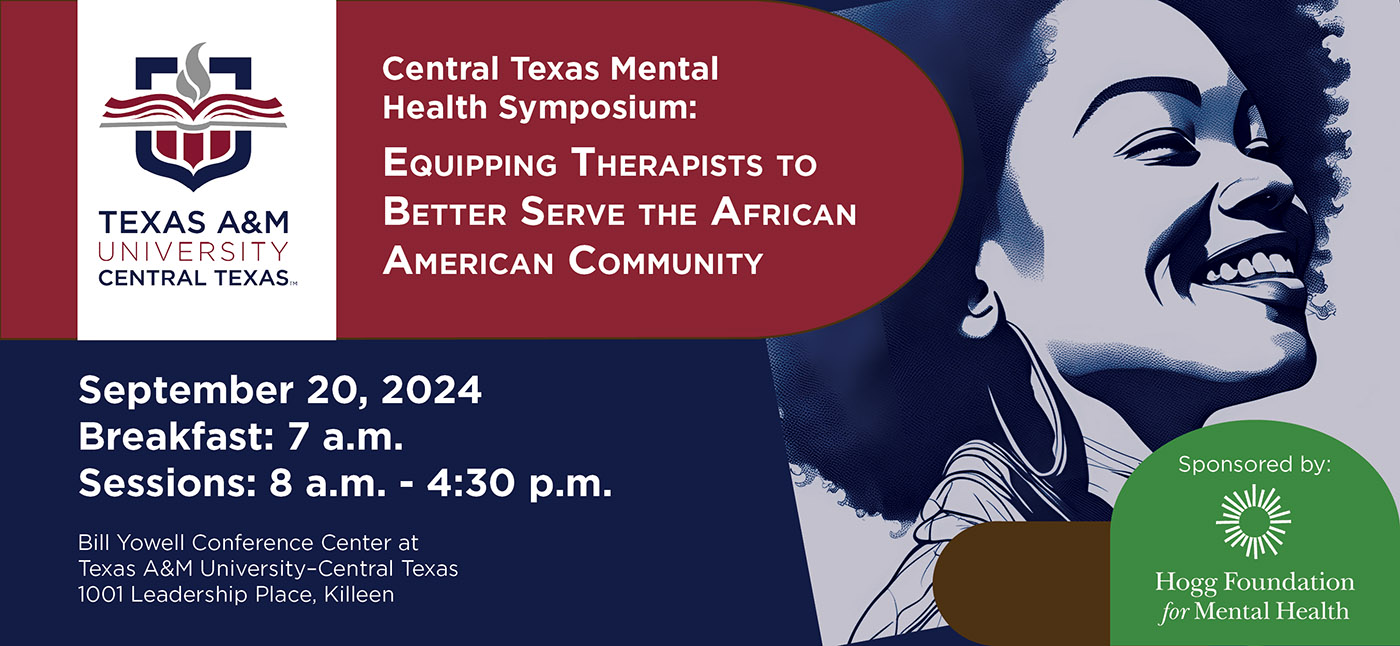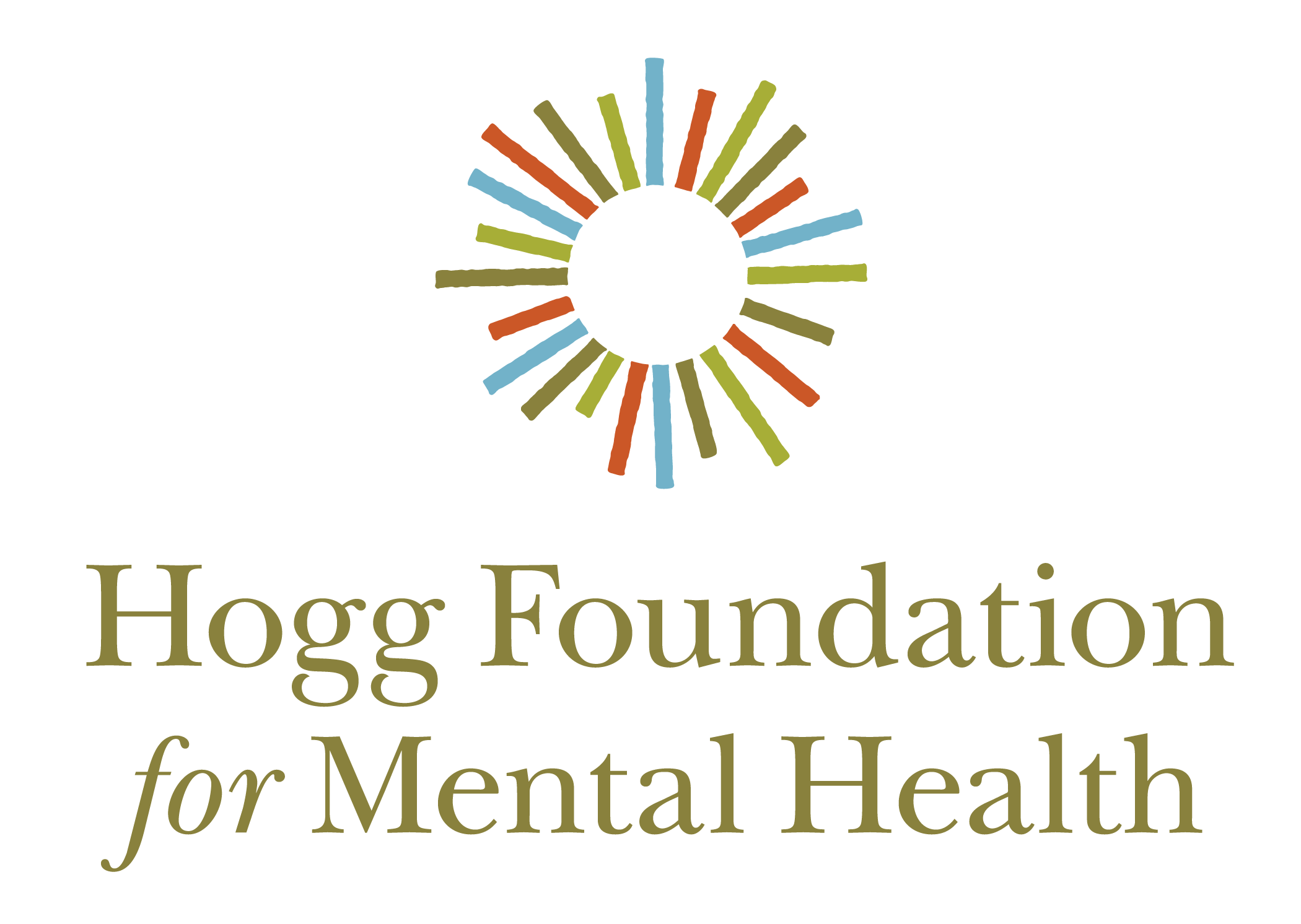

Thanks to a grant from the Hogg Foundation for Mental Health, Texas A&M University Central Texas is hosting a free one-day conference on campus to support therapists' cultural competence in working with African American clients.
The aim of this free one-day event is to help therapists develop effective strategies for engaging with African American families to foster competent, culturally effective mental health services in Bell County.
Breakfast and lunch will be provided. CEUs will be issued to participants. Licensed therapists and graduate students in the mental health field are encouraged to attend.
The conference is free, but registration is currently full. If you have registered but cannot attend, please contact the conference committee at ctsconference2024@gmail.com as soon as possible to help us plan accordingly. If you have any questions or need further information, please contact the conference committee at ctsconference2024@gmail.com.

This in-person event will offer 6.5 CEUs and complimentary breakfast and lunch. Sessions will be presented live, and attendees will have multiple networking opportunities.
Texas A&M University-Central Texas
1001 Leadership Place
Killeen, TX 76549
The conference will be held on campus in the Bill Yowell Conference Center, located in Warrior Hall.
Campus parking is free. Parking lot B is located closest to Warrior Hall, where the conference will be held. Please arrive early to allow time for parking and check-in!
| Time | Activity | |
| 7 am - 8 am | Check-in & Breakfast | |
| 8 am - 8:30 am | Welcome | |
| 8:30 am - 9:45 am | Healing a Bloodline of Trauma: Understanding Cultural Mistrust, Bias, & the Psychological Effects of Racism; G.P. Wardlaw, M.A., LMFT-S, LPC-S (VA & TX). Bio and abstract | |
| 10 am - 11:15 am | Worthy to Heal: EMDR & Cultural Competence; Karissa Doster-Hoffman, DSW(c), LCSW-S, LCDC. Bio and abstract | |
| 11:15 am - 11:45 am | Pick up boxed lunch | |
| 12:00 PM - 1:30 PM | Networking Workshop – Voices from the Field: Uniting as One; Tamara Fields, Ed.D.(c), MSW, LCSW-S. Bio and abstract | |
| 1:45 PM - 3:00 PM | Culturally Competent Case Conceptualization with Black Women; Kimber Shelton, Ph.D. Bio and abstract | |
| 3:15 PM - 4:30 PM | Empowering Women with Characteristics of the Black Superwoman Schema through Body-Based Interventions; Jade Hunter, Ph.D., LPC, LMFT. Bio and abstract |
G.P. Wardlaw, M.A., LMFT-S, LPC-S (VA &TX) |
|
Presentation Name |
Healing a Bloodline of Trauma: Understanding Cultural Mistrust, Bias & the Psychological Effects of Racism |
Time Slot |
8:30 AM - 9:45 AM |
Bio |
G.P. Wardlaw is a believer, devoted husband, and father of five beautiful and dynamic daughters. As a dually licensed marriage and family therapist and professional counselor, he holds supervisor designations in both Virginia and Texas. In 2018, after realizing that Waco, a city with over 275,000 residents, had no African-American male therapists offering services, he and his wife founded The Relationship Clinic with a mission to make relationships whole. By 2020, TRC evolved into a training clinic for interns and associates, fostering the development of culturally responsive therapists. Through his nonprofit, iHRT, G.P. is dedicated to providing culturally competent care and destigmatizing therapy, especially for those healing from racial trauma. When not in session, he enjoys traveling, indulging in good food with his wife, and learning new hairstyles to perfect on his daughters' hair. |
Abstract |
This in-person session explores the historical contexts of Racial Trauma (RT) and its impact on Black marriage. Learners will understand the importance of practical assessment of RT in clinical and educational contexts. Attendees will leave understanding ways to address RT with clients. |
Objectives |
|
Karissa Doster-Hoffman, DSW(c), LCSW-S, LCDC
|
||
Presentation Name |
Worthy to Heal: EMDR & Cultural Competence |
|
Time Slot |
10:00 AM – 11:15 AM |
|
Bio |
Karissa graduated from Spalding University in Louisville, KY in 2014 with a Master of Social Work degree. With education being the forefront of her life, this accomplishment was the beginning of a career of her dreams: to become a Licensed Clinical Social Worker. Currently, she works closely with those experiencing trauma related issues, depression, anxiety, relationship issues, addiction, identity issues, and more. As a Black queer woman, she believes representation is imperative for her fellow BIPOC folx and BPOQe folx to have options in the mental health world. Her goal is to provide quality, client-centered therapeutic service while bringing her genuine self to every session. She believes to help others on their journey to mental wellness and sustainability is a gift given to her to share. Karissa’s philosophy is best represented in the quote, “Change will not come if we wait for some other person or some other time. We are the ones we’ve been waiting for. We are the change that we seek,” President Barack Obama, 44th President of the United States of America. Enacting change, in Karissa’s opinion, means inserting yourself in spaces where that change is needed. Karissa’s passion surrounding holistic advocacy for the Black and Black Queer community is the foundation for all her current and future endeavors. Karissa looks forward to every potential connection and intentional nurturing of the relationships that develop. |
|
Abstract |
The importance of culturally competent trauma therapy cannot be overstated. There are many therapeutic interventions available to clinicians, most of which claim to be both trauma-informed and culturally competent. However, think about the times a modality must be adapted to fit this claim. Trauma informed therapy is effective only when a holistic approach is utilized. Trauma affects individuals differently based on their cultural backgrounds, values, and experiences. Culturally competent therapy recognizes and respects these differences, ensuring that treatment is tailored to meet the unique needs of each individual. This approach fosters a deeper connection between the clinician and the client, promoting trust and a more effective therapeutic alliance. Worthy to Heal: EMDR & Cultural Competence takes a deep dive into the gaps in EMDR as they relate to cultural competence and treating BIPOC and other minoritized populations. This presentation explores evidence-based research and theory to provide a foundation for how EMDR can be used to fill the gaps. Culturally competent trauma therapy addresses systemic issues and historical trauma that may disproportionately impact BIPOC and other marginalized communities. By incorporating an understanding of these broader contexts, therapists can help clients navigate the complexities of their experiences, leading to more holistic and sustainable healing. Experiential aspects are also noted as critical race theory (CRT) urges clinicians and practitioners to elevate the voices of the marginalized as their experiences are valid in the journey to heal. Through this presentation, participants are reminded that everyone is worthy to heal. |
|
Objectives |
|
|
Tamara Fields, Ed.D.(c), MSW, LCSW-S
| ||
Presentation Name |
Voices from the Field: Uniting as One |
|
Time Slot |
12:00 PM – 1:30 PM |
|
Bio |
Tamara P. Fields is a Licensed Clinical Social Worker-Supervisor and Doctoral Candidate with over 25 years advocating for mental and emotional well-being. Specializing in trauma and adverse childhood experiences, she prioritizes excellence and integrity in the delivery of quality mental health services. Tamara is the visionary behind Crystal Clear Behavioral Health and Crystal Clear Children and Youth Services. Tamara is also the co-author of Favian and Maven Presents: When Your Body Talks, dedicated to raising awareness and preventing sexual abuse against children. As the Executive Producer and Resident Therapist of the documentary When the Soul Cries: Trauma. Tears. Triumph. available on Amazon Prime Video, she amplifies voices and narratives surrounding healing from trauma. Through her company, The Real Therapish, LLC, Tamara facilitates healing retreats and empowerment sessions helping women to rewrite their narratives to overcome emotional pain. Tamara is a speaker, adjunct professor, and Branch Chair of the CTX NASW. |
|
Abstract |
This presentation outlines strategies for mental health professionals to collaboratively enhance services for the BIPOC community. Emphasizing interdisciplinary networking, it aims to increase service impact, awareness, and availability, fostering an inclusive environment for improved mental health outcomes. |
|
Objectives |
|
|
Kimber Shelton, Ph.D.
| ||
Presentation Name |
Culturally Competent Case Conceptualization with Black Women |
|
Time Slot |
1:45 PM – 3:00 PM |
|
Bio |
Dr. Kimber Shelton is a licensed psychologist, author, and speaker. Her practice, KLS Counseling & Consulting Services, specializes in addressing cultural diversity, LGBTQ issues, trauma, and relationship concerns. The 2023 Black Mental Health Symposium Distinguished Practitioner of the Year, Dr. Shelton is an award-winning psychologist committed to creating transformative healing spaces for minoritized groups. She has over 20 publications, including the Amazon Best Seller, A Handbook on Counseling African American Women, and has contributed to CNN, Yahoo!, and Huff Post articles. Dr. Shelton has provided cultural competence training to thousands of health professionals, and works with groups and organizations to support their diversity and wellness initiatives. She is the cofounder of the Counseling Black Women Collective, a platform supporting Black Women’s mental wellness and highlighting Black women therapists. She earned her PhD in Counseling Psychology from the University of Georgia and MS in Mental Health Counseling from Niagara University. |
|
Abstract |
Abstract: With greater access to care, destigmatizing therapy, and increased focus on mental wellness, Black women are entering therapy at higher rates than in the past. Unfortunately, when met with culturally incompetent care, therapy fails them. Case conceptualization is a cornerstone of effective mental health treatment and impacts all facets of psychotherapy. A case conceptualization summarizes the therapist’s theoretical understanding of the client’s presenting concerns, considerations for the development of said concerns, and ideas for treatment and intervention. A general case conceptualization may be insufficient in capturing Black women’s cultural and nuanced needs and strengths. A multicultural case conceptualization focuses on integrating cultural awareness to better understand clients and the issues impacting their mental wellbeing. This includes a focus on culture, discrimination, oppression, and using culturally relevant interventions (Constantine, 2001). This workshop provides a historical context for cultural considerations and case conceptualization. The workshop will define culturally competent case conceptualization and identify strategies for effectively creating cultural case conceptualizations. |
|
Objectives |
|
|
Jade Hunter, Ph.D., LPC, LMFT
| ||
Presentation Name |
Empowering Women with Characteristics of the Black Superwoman Schema through Body-Based Interventions |
|
Time Slot |
3:15 PM – 4:30 PM |
Bio |
Dr. Jade Hunter is a trauma-informed psychotherapist dedicated to supporting BIPOC young adults and families. She holds a Master's in the Arts of Counseling from Dallas Baptist University and a Doctorate in Marriage and Family Therapy. A Licensed Professional Counselor and a Licensed Marriage Family Therapist in Texas. With over a decade of experience, Dr. Hunter is passionate about breaking generational trauma cycles within the Black community and employs evidence-based practices such as EMDR and mindfulness and Attachment-based therapies. Her experience includes roles at various University Counseling Centers, particularly at the University of North Texas in the Program for Counseling Diverse Students. Currently, she is a private practice clinician focused on supporting BIPOC Millennials and LGBTQIA+ clients, emphasizing inclusivity and affordable mental health care. In addition to her clinical work, Dr. Hunter is currently pursuing certifications as a 200-hour Registered Yoga Teacher and Psychotherapeutic Yoga Teacher to enhance her therapeutic approach. |
Abstract |
This presentation aims to deepen understanding of the Black Superwoman (SBW) schema by exploring its defining characteristics, historical context, and implications for mental health. Participants will learn to identify the common symptoms and reasons clients with the SBW schema may seek therapy, while also understanding the cultural and social factors that impact their therapeutic experiences. Additionally, the presentation will introduce body-based interventions tailored for these clients and provide hands-on experience through guided exercises, equipping therapists with practical tools to enhance their therapeutic practice. |
|
Objectives |
|
|
